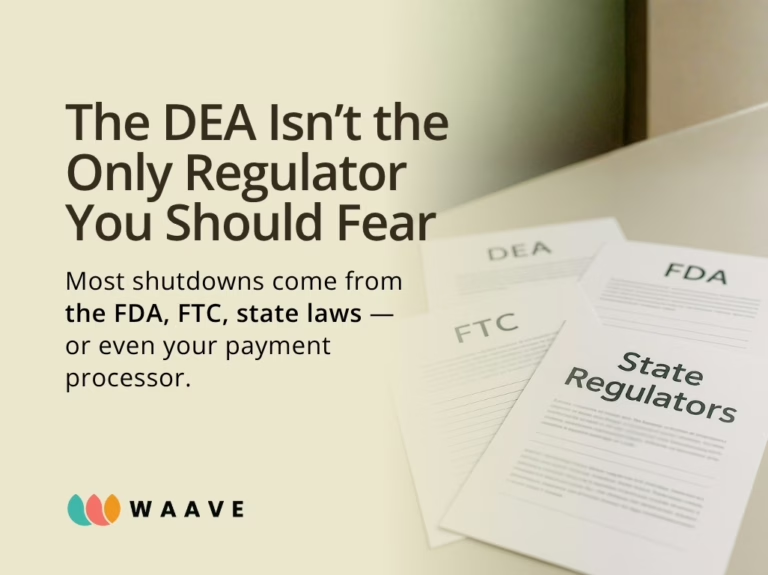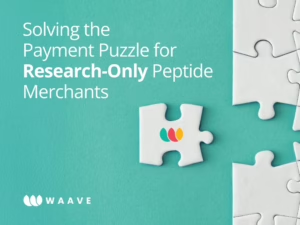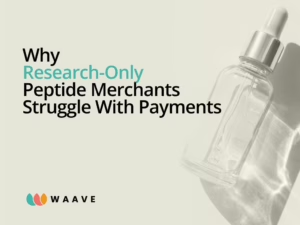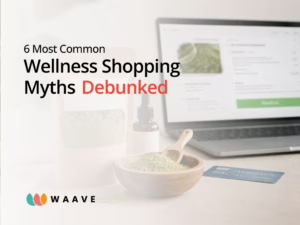Why the DEA Isn’t the Whole Story
Many wellness sellers believe the Drug Enforcement Administration (DEA) is the biggest threat to their business.
But in reality, most shutdowns, product seizures, and payment freezes come from other regulators. The FDA, FTC, state authorities, and even payment processors have the power to end your operations overnight — often without a DEA raid in sight.
Understanding how these agencies overlap is critical for maintaining wellness business compliance and keeping your merchant account active.
- The FDA: The Labeling & Claims Enforcer
The Food and Drug Administration (FDA) regulates how you manufacture, market, and label wellness products — from CBD tinctures to kratom capsules.
Its focus is truthful labeling and scientific support for any product claims.
Common FDA Enforcement Triggers
- Health or disease claims (“reduces anxiety,” “helps with pain”)
- Missing or outdated Certificates of Analysis (COAs)
- Products sold without proper ingredient disclosure
- Misleading labeling or dosage statements
Once you receive an FDA warning letter, your brand becomes publicly listed — and payment processors, marketplaces, and distributors may cut ties instantly.
2. The FTC: Advertising Watchdog
The Federal Trade Commission (FTC) oversees your advertising practices — including what influencers, affiliates, or resellers say about your products.
They ensure all marketing statements are truthful, not deceptive, and backed by credible evidence.
Top FTC Red Flags
- Using unsubstantiated claims like “clinically proven”
- Posting or allowing fake customer reviews
- Making health comparisons without proof
- Omitting the required disclosure in influencer posts
The FTC doesn’t just fine brands — they publish settlements that damage reputation and destroy consumer trust.
3. State Regulators: The Real Risk for Wellness Businesses
Every U.S. state has its own laws regarding hemp, cannabinoids, kratom, and other wellness ingredients.
State agriculture or health departments can issue fines, stop-sale orders, and license suspensions — even if your product meets federal standards.
Recent State-Level Actions
- Maryland: Banned Delta-8 and Delta-10 products.
- Texas: Outlawed vapes containing hemp-derived cannabinoids.
- Florida: Enforced new kratom labeling and age-gating requirements.
That’s why state-specific compliance is the number one reason payment processors freeze funds or terminate accounts.
4. Payment Processors: The Unofficial Regulators
Your payment processor isn’t a government agency, but it operates like one.
They assess the legality and risk level of every transaction, often going beyond what the DEA or FDA requires.
Processor Compliance Checks Include:
- Product legality by state or city
- Valid COAs for each SKU
- Accurate ingredient listings and disclaimers
- Transparent shipping rules and age verification
If your processor detects a compliance issue, it can instantly block payments or hold funds — no warning required.
5. Multi-Agency Compliance Is the New Standard
In 2025, wellness businesses can no longer rely on “DEA-only” compliance.
A sustainable business model must meet all layers of regulation — federal (DEA, FDA, FTC), state, and payment-processor standards.
Ignoring one means risking them all.
Stay Fully Compliant with WAAVE
WAAVE helps wellness sellers operate safely across every regulatory layer — from ingredient validation to payment approval.
Our compliance technology monitors:
- State-by-state product legality
- COA accuracy and expiration dates
- Marketing and labeling risk keywords
- Shipping restrictions by jurisdiction
WAAVE keeps your store compliant, transactable, and trusted — no surprises, no shutdowns.
👉 Learn how WAAVE keeps your business compliant.






